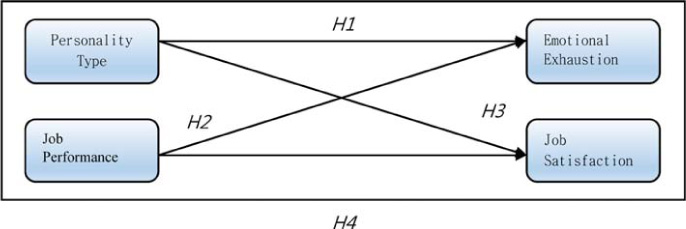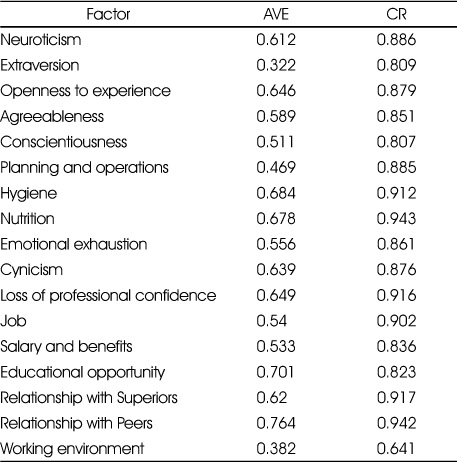Articles
- Page Path
- HOME > Korean J Community Nutr > Volume 23(6); 2018 > Article
-
Research Article
- The Effect of Personality Type and Job Performance on Emotional Exhaustion and Job Satisfaction - Staff of the Center for Children's foodservice management -
-
Kyung-Min Lee, Min-Sun Jeon

-
Korean Journal of Community Nutrition 2018;23(6):496-505.
DOI: https://doi.org/10.5720/kjcn.2018.23.6.496
Published online: December 31, 2018
1National Institute of Food and Nutrition Service, Cheongju, Korea.
2Department of Food and Nutrition, Chungnam National University, Daejeon, Korea.
- Corresponding author: Min Sun Jeon. Department of Food and Nutrition, Chungnam National University, 99, Daehak-ro, Yuseong-gu, Daejeon 34134, Korea. Tel: (042) 821-6836, Fax: (042) 821-8887, dearms@cnu.ac.kr
Copyright © 2018 The Korean Society of Community Nutrition
This is an Open-Access article distributed under the terms of the Creative Commons Attribution Non-Commercial License (http://creativecommons.org/licenses/by-nc/3.0/) which permits unrestricted non-commercial use, distribution, and reproduction in any medium, provided the original work is properly cited.
- 289 Views
- 0 Download
- 1 Crossref
Abstract
-
Objectives
- This study examined the relationship between the personality traits and job performance of Centers for Children's Foodservice Management (CCFSM) staff on emotional exhaustion and job satisfaction. In addition, the characteristics of the center organization were examined to provide practical guidelines for the operation of the center. The aim was to determine management implications with an important meaning in human resource management to enhance the efficiency of the operation of Centers for Children's Foodservice Management (CCFSM).
-
Methods
- Out of 207 centers, there were 1,057 employees at 173 centers who agreed to participate in the study, the questionnaire was mailed on February 17, 2017 and collected by mail on March 31, 2017. Finally, 81 centers (46.82%) participated in the survey and 493 questionnaires were used.
-
Results
- Neuroticism among the five personality factors had a positive (+) influence on ‘cynicism’ and ‘exhaustion’ among the three subordinate factors of emotional exhaustion, negative (−) effects on the ‘job’ among the six subscales of job satisfaction. In addition, openness showed a negative (−) effect on ‘loss of professional confidence’ of emotional exhaustion and positive (+) relationship with the ‘job’ of job satisfaction. Agreeableness appeared to have a negative (−) effect on all factors of emotional exhaustion and a positive (+) influence on all factors of job satisfaction. As a result of analyzing the effects of job performance on emotional exhaustion and job satisfaction, the planning and operations management team showed a positive (+) influence on all factors of emotional exhaustion and negative (−) influence on all factors of job satisfaction. On the other hand, the nutrition management team showed a negative (−) influence on all emotional exhaustion factors and a positive (+) influence on the factors of job satisfaction. The hygiene management team showed a positive (+) relationship with ‘Emotional exhaustion’ among the subordinate factors of emotional exhaustion and a negative (−) influence on the ‘Educational opportunity’ of job satisfaction.
-
Conclusions
- The personality type and job performance of Centers for Children's foodservice management (ccfsm) staff significantly affected the emotional exhaustion and job satisfaction.
- 1. Koo MK. Study on the job satisfaction of female public servants: focusing on the 9th grade national assemblyman secretary [master's thesis]. Yonsei University; 2000.
- 2. Ministry of Employment and Labor. Economically active population by sex / age [internet]. Korean statistical information service; 2018; cited 2018 Mar 14]. Available from: http://kosis.kr/.
- 3. Ministry of Health and Welfare. Yearly child care center childcare status [internet]. Korean statistical information service; 2017; cited 2017 Oct 24]. Available from: http://kosis.kr/.
- 4. Jeon MY. A study on operation of younger children's daycare facilities: focused on national and public children's houses in Youngdungpo-gu, Seoul [master's thesis]. Dongguk University; 2006.
- 5. Kang GN. According to the actual conditions of early childhood care centers feedservice parent satisfaction study: focused Incheon [master's thesis]. Incheon National University; 2015.
- 6. Ministry of Food and Drug Safety. Korean childcare service guideline. Cheongju: Ministry of Food and Drug Safety; 2017. p. 3-96.
- 7. Seo YJ, Jeon MS. Effects of an education program on sanitation status at Centers for Children's Food Service Management: focusing on Jung-gu and Dong-gu regions of Daejeon metropolitan city. Korean J Community Nutr 2015; 20(6): 447-459.Article
- 8. Kim HY, Yang IS, Chae IS, Yi BS, Park MK, Kim HY. Effectiveness of center for Child-Care Foodservice Management for menu management and dietary variety. Korean J Community Nutr 2013; 18(3): 243-256.Article
- 9. Park EH, Lee YE. Task satisfaction, job satisfaction, organizational commitment, and turnover intension of Center for Children's Foodservice Management Employees. J Korean Soc Food Sci Nutr 2015; 44(12): 1881-1894.Article
- 10. Kim JH. The effects of high commitment HRM on internalization of HRM practices, organizational commitment and quality management activity. Korea Labor Inst 2009; 9(3): 81-111.
- 11. Lee HR, Kang JR, Park JR. The relationship of private kindergarten teacher's job stress and their ways of coping by neuroticism and conscientiousness. Cent Educ Res 2014; 30(2): 273-294.Article
- 12. Lee JH, Kang JM. A study on the effects of job education and training program on task efficiency and job satisfaction: focused on job satisfaction of midsize and large businesses in Cheongju. J Converg Inf Technol 2018; 8(2): 171-181.
- 13. Lim A, Park YK, Back YJ. The effects of emotional dissonance on the employees' job satisfaction and organizational citizenship behavior: mediating effect of exhaustion and stress and moderating effects of personality and tenure. Korean Acad Soc Bus Adm 2016; 45(2): 615-658.Article
- 14. Maslach C, Jacson SE. The measurement of experienced burnout. J Occup Behav 1981; 2(2): 99-113.Article
- 15. Shin KH. The maslach bunout inventory-general survey (MBI-GS): an application in South Korea. Korean J Ind Organ Psychol 2003; 16(3): 1-17.
- 16. Smith PC, Kendall LM, Hulin CL. The measurement of satisfaction in work and retirement: a strategy for the study of attitudes. Chicago: Rand McNally & Co; 1969.
- 17. Costa P, McCrea RR. The NEO PI-R professional manual: revised NEO five factor inventory. Odessa, FL: Psychological Assessment Resources; 1992.
- 18. Lee KI, Ahn CG. Clinical application of the revised NEO personality inventory. Korean J Couns Psychother 1996; 8(1): 65-79.
- 19. Kim HY, Lee KY. The structural relationships among personality, interpersonal relation traits, and aptitude of school for pre-service elementary school teacher. Korean Assoc Learn Cent Curric Instr 2015; 15(10): 615-634.
- 20. Jeong HW, Choi EK, Kim HS. A study on the relationships among training motivation factors, employees` training satisfaction, and job satisfaction in foodservice operations. Culin Sci Hosp Res 2012; 18(5): 165-175.Article
REFERENCES
If the personality type is an independent variable, research model structural equation analysis results

Figure & Data
REFERENCES
Citations

- Study on the relationship between employee perception of overqualification, job burnout, and impulsive buying behavior
Li Chaoyang, Fang Yuanhan, Yu Zengyuan, Li Huitao
Current Psychology.2025;[Epub] CrossRef

Fig. 1
Study of variables model fit index
1) CMIN : minimum chi-square, 2) P-value : P<0.001, 3) χ2/df : chi-squared distribution/degree of freedom, 4) RMSEA : Root Mean Square Erro of Approximation, 5) CFI : Comparative Fit Index, 6) NFI : Normed Fit Index, 7) TLI : Tucker-Lewis Index, 8) IFI : Incremental Fit Index
***: p<0.001
AVE and conceptual reliability
1) AVE : Average Variance Extracted
2) CR : Construct reliability
If the personality type is an independent variable, Research Model Fit Index
1) CMIN : minimum chi-square, 2) P-value : P<0.001, 3) χ2/df : chi-squared distribution/degree of freedom, 4) RMSEA : Root Mean Square Erro of Approximation, 5) CFI : Comparative Fit Index, 6) NFI : Normed Fit Index, 7) TLI : Tucker-Lewis Index, 8) IFI : Incremental Fit Index
***: p<0.001
If the personality type is an independent variable, research model structural equation analysis results
***: p<0.001
If job performance is an independent variable, Research Model Fit Index
1) CMIN : minimum chi-square, 2) P-value : P<0.001, 3) χ2/df : chi-squared distribution/degree of freedom, 4) RMSEA : Root Mean Square Erro of Approximation, 5) CFI : Comparative Fit Index, 6) NFI : Normed Fit Index, 7) TLI : Tucker-Lewis Index, 8) IFI : Incremental Fit Index
***: p<0.001
If job performance is an independent variable, research model structural equation analysis results
***: p<0.001
1) CMIN : minimum chi-square, 2) P-value : P<0.001, 3) χ2/df : chi-squared distribution/degree of freedom, 4) RMSEA : Root Mean Square Erro of Approximation, 5) CFI : Comparative Fit Index, 6) NFI : Normed Fit Index, 7) TLI : Tucker-Lewis Index, 8) IFI : Incremental Fit Index ***: p<0.001
1) AVE : Average Variance Extracted 2) CR : Construct reliability
1) CMIN : minimum chi-square, 2) P-value : P<0.001, 3) χ2/df : chi-squared distribution/degree of freedom, 4) RMSEA : Root Mean Square Erro of Approximation, 5) CFI : Comparative Fit Index, 6) NFI : Normed Fit Index, 7) TLI : Tucker-Lewis Index, 8) IFI : Incremental Fit Index ***: p<0.001
***: p<0.001
1) CMIN : minimum chi-square, 2) P-value : P<0.001, 3) χ2/df : chi-squared distribution/degree of freedom, 4) RMSEA : Root Mean Square Erro of Approximation, 5) CFI : Comparative Fit Index, 6) NFI : Normed Fit Index, 7) TLI : Tucker-Lewis Index, 8) IFI : Incremental Fit Index ***: p<0.001
***: p<0.001

 KSCN
KSCN






 PubReader
PubReader Cite
Cite


